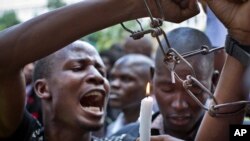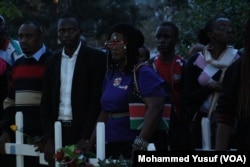Hundreds of Kenyans gathered Tuesday night for what they said was the chance to individually honor the 148 students killed in last Thursday's terrorist attack at Garissa University College.
Boniface Mwangi, an organizer of the vigil, said the students did not deserve to die.
“You don’t go to school to die, you go to school to study," he said. "Families took loans. Garissa is very far for a family to send its child. ... That means they actually struggled to raise money to send a child there. Then you get back a dead body. That’s not fair at all. Then the government response has been like, 'I don’t really care.' ”
Those taking part in the vigil said they had personal reasons for doing so.
One former university student, Peter Okumu, said he'd come to the event "to be in unison with my friends, fellow comrades who we’ve lost, representing the other alumni who are not able to come here. We are mourning because we lost brothers and sisters. It would have been us had we been in school at this time. So together we mourn them, and we say as much as they have killed them, their vision lives in us, and will make sure that the vision moves forward for a brighter and better Kenya.”
Grace Mageka, a member of Peace Ambassador Kenya, said she had yet to come to terms with why one of the attackers — the son of a local chief in Mandera county and a law school graduate — could carry out such an attack.
“I cannot understand," she said. "This is something the government needs to look and find out what is happening. But the whole thing, it made us to be alert. We have to walk with our heads up.”
In 2013, the father reported his son to the authorities and told them he suspected his son might have joined al-Shabab.
Investigators are trying to learn more about the identity of all the attackers.
Leaders from northeastern Kenya have vowed to name sympathizers, fighters and financiers of the Somali militant group al-Shabab. Kenyan authorities have welcomed that announcement.
Witnesses and survivors of the Garissa University attack and other previous attacks in the country said al-Shabab fighters have divided their victims along religious lines, killing Christians and leaving Muslims to walk free. Security observers say the group is trying to divide the country's majority Christians and minority Muslims.
Jinna Mutune, one of the mourners in central Nairobi, said Kenyans should not be divided by such terror groups and should work on building a prosperous country.
“Kenya belongs to diverse religious groups and we should all stay peacefully together, even if we have different beliefs," Mutune said. "I don’t think religion should be a dividing factor in the fact that we are building a nation called Kenya.”
Tuesday was the last day of national mourning. So far, more than 120 students killed at Garissa have been identified. The process of identification is continuing at a city mortuary. Officials hope to complete the process before the end of the week so that parents can go ahead with funeral and burial arrangements.





